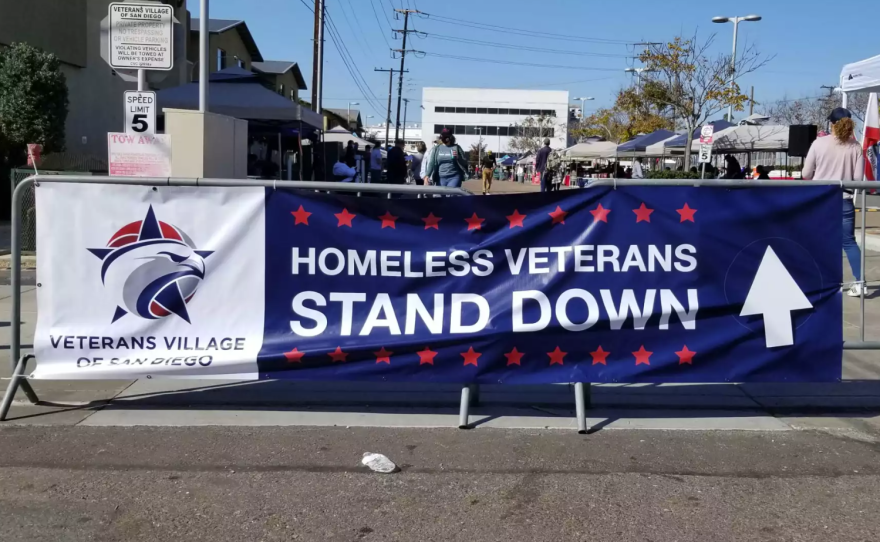Oversight agencies and lawmakers continue to scrutinize health and safety issues at San Diego’s premier rehab center for veterans. A state health care agency is conducting eight investigations into the organization, and county officials continue their six-month-long admissions freeze.
The treatment center was also temporarily barred from accepting new San Diego VA clients late last year due to compliance issues.
Veterans Village of San Diego, which operates the substance use treatment program on Pacific Highway, was the subject of an inewsource investigation in June that exposed health hazards, a severe staffing shortage, widespread drug use, overdoses, deaths and other problems inside the facility.
In total, Veterans Village received $17 million from different government agencies in the 2021 fiscal year, the most recent data available, including $6 million overseen by San Diego County Behavioral Health Services.
Documents newly obtained by inewsource detail the nonprofit’s struggle to comply with government requirements.
In May, when county officials reviewed the nonprofit’s case files, they found that staff hadn’t documented enough hours of care, progress reports were missing and there was little to no evidence of drug testing or contact with clients’ probation officers.
Then, in July, the fourth death of the year occurred at the nonprofit’s flagship campus, which includes the substance use treatment program and transitional housing facilities. That prompted county officials to stop sending clients to the rehab center for their safety and wellbeing.
As a result, Veterans Village agreed to a slew of new protocols to help residents at high risk of overdose — checking rooms more frequently, removing and replacing bathroom door locks, increasing urinalysis testing, providing escorts for off-campus trips and conducting transfers to more intensive care if needed.
That wasn’t enough to convince the county to admit clients again.
According to county records, the admissions freeze will stay in place until Veterans Village achieves a compliance score of 70% or higher. As of mid-January, its most recent score was 49%.
“We have not resumed placements at this time,” county spokesperson Mike Workman said.
As part of the nonprofit’s Corrective Action Plan, county officials are conducting on-site training, in-depth records reviews and quality assurance meetings with Veterans Village leadership. They are also monitoring procedures around off-site passes and room searches.
A six-month admissions freeze “seems like a long time,” said Scott Silverman, the CEO and founder of Confidential Recovery, an intensive outpatient treatment program in San Diego that works with veterans.
Silverman said supervision, staffing, drug testing and case management are crucial tools to ensure vulnerable patients are safe and secure.
“It’s the responsibility of the people that operate the treatment center to have the level of efficacy to make sure each client is being monitored,” he added.
Health and safety
Akilah Templeton, the chief executive officer of Veterans Village, said in an interview with inewsource in May that her organization continues to provide high-quality care to clients in the face of many difficulties, including the opioid crisis, the COVID-19 pandemic and an industry-wide staffing shortage.
Since then, she has challenged the ongoing coverage of the nonprofit, saying it has been fueled by sources with “hostile motives.”
In January, inewsource asked Templeton to answer questions about her goals for the organization, the county’s admissions freeze, the ongoing state investigations and other issues. In response, a spokesperson sent a letter that did not directly answer the questions and accused inewsource of biased and inaccurate reporting. The letter did not document any factual errors.
inewsource Managing Editor Mark J. Rochester said he disagrees with the allegations concerning motivations for the reporting and questions about the newsroom’s integrity contained in the letter available here.
“Government oversight authorities at the county and state level have raised serious allegations about health and safety conditions at VVSD,” he said. “Negative conditions at VVSD were detailed in publicly available government reports long before inewsource began investigating the facility and aren’t some fantasy concocted by our reporter.
“We stand by the accuracy of our months worth of investigative reporting on the facility.”
Records from the San Diego VA show the nonprofit was temporarily put on a Corrective Action Plan in 2021 due to a number of concerns that later surfaced in inewsource’s reporting, including a staffing shortage, a failure to supervise clients and an inadequate bed check policy.

According to a San Diego VA spokesperson, the government agency halted admissions of new VA-funded clients in August and September last year because of problems with kitchen facilities and staffing levels. Admissions resumed within 30 days when the issues were resolved.
inewsource wrote about poor quality food and sanitation issues at Veterans Village in its investigation last year.
“VA and VVSD staff continue to meet frequently to ensure ongoing compliance and safety,” VA spokesperson Scott Gomer said.
The California Department of Health Care Services, which provides Veterans Village with its license, said eight investigations into the nonprofit are underway but did not elaborate because the cases are ongoing.
“DHCS is currently working with VVSD to ensure client health and safety, and established regular communication between DHCS representation and VVSD to discuss ways for VVSD to come into compliance with all applicable Health and Safety Codes,” spokesperson Anthony Cava said.
Last year, the Drug Enforcement Administration, which investigates possible fentanyl-related deaths in San Diego, was looking into two suspected fentanyl overdoses that occurred at the Veterans Village campus.
A spokesperson said the DEA Overdose Response Team was unable to identify supply sources in either case, and one of the deceased did not have fentanyl in his system, leading the agency to close its investigations.
Next steps
Since issues at Veterans Village came to light last year, lawmakers have sought answers and solutions.
“I remain concerned about the challenges at Veterans Village and am monitoring the situation there,” said Rep. Mike Levin. “They must be taken seriously.”
Levin’s congressional district includes the Camp Pendleton Marine Corps base, and he serves as a chair of the House Committee on Veterans’ Affairs.
“My team and I have been in touch with Veterans Village’s leadership and federal authorities to discuss the complaints and remedial actions,” he added.
Toni Atkins, California Senate President pro Tempore, also said she’s staying informed of the situation at the nonprofit.
“Veterans Village of San Diego has a long history of providing valuable services to our veteran community,” said Atkins. “I am aware of the audits and investigations, and I continue to monitor the situation.”
Atkins is a longtime supporter of Veterans Village and attends the nonprofit’s renowned annual event, Stand Down, that connects homeless veterans with community resources. It has been replicated in hundreds of cities and praised by two U.S. presidents.

“It is my hope that these issues are resolved in a manner that allows VVSD to move forward to fill their important mission,” she said.
During last year’s Stand Down, Veterans Village leadership and board members met with another state legislator — Assemblymember Chris Ward, whose district used to include the Veterans Village campus.
“Assemblymember Ward is concerned about the situation at Veterans Village,” said spokesperson Mike Blount. “He has continued to monitor the situation as the nonprofit works to address myriad issues at the facility.”
Ward’s office said he is working at the state level to address the staffing challenges affecting Veterans Village.
The lawmaker recently advocated for additional funding in the state budget to train more substance use disorder counselors. He also authored AB 1860, which reduces requirements for counselors-in-training with the goal of increasing staff levels. The law went into effect in January.
"While a shortage of substance abuse disorder counselors and other staff in treatment facilities has been an ongoing issue, (Ward) believes Veterans Village can still be an important resource for San Diegans who are struggling with addiction,” the spokesperson said.
Staffing shortages have affected many social service providers as low pay and the COVID-19 pandemic have led to burnout and high turnover.
Rep. Scott Peters, whose Congressional district includes the rehab center, is also exploring ways Veterans Village can attract qualified employees, according to his office.
“We also plan to check in with the VA on a periodic basis to hear their assessment of VVSD’s performance,” MaryAnne Pintar, the Congressman’s chief of staff, told inewsource in July. She did not respond to recent follow-up questions.
Pintar previously said that the nonprofit’s difficulties “seem to stem from VVSD’s transition from their traditional abstinence-based model to the ‘housing first’ model adopted by the city and the county and many homeless advocates as a more effective and compassionate way to get people housed and into the care they need to find stability.”
“This new clientele brings with it new challenges because they are not required to be completely sober while enrolled in their programming,” she added.

Silverman, the addiction recovery expert, said despite the many difficulties and changes occurring in the substance use treatment industry, providers must protect their clients and take responsibility when health and safety issues arise.
“You’re in the business to help save lives,” he said. “If you don’t know how or you can’t do it anymore, you need to hand it off to somebody else. Period.”
Veterans Village is credited with serving thousands of veterans each year and offering life-saving support to people in need. The nonprofit provides housing, addiction treatment, employment assistance, dental care and other services.
Silverman said Veterans Village fills an important role in the community and oversight agencies should do what they can to preserve it.
“What’s the next step? Because VVSD has historically provided a unique service, and they’re not going to be replaced easily.”










